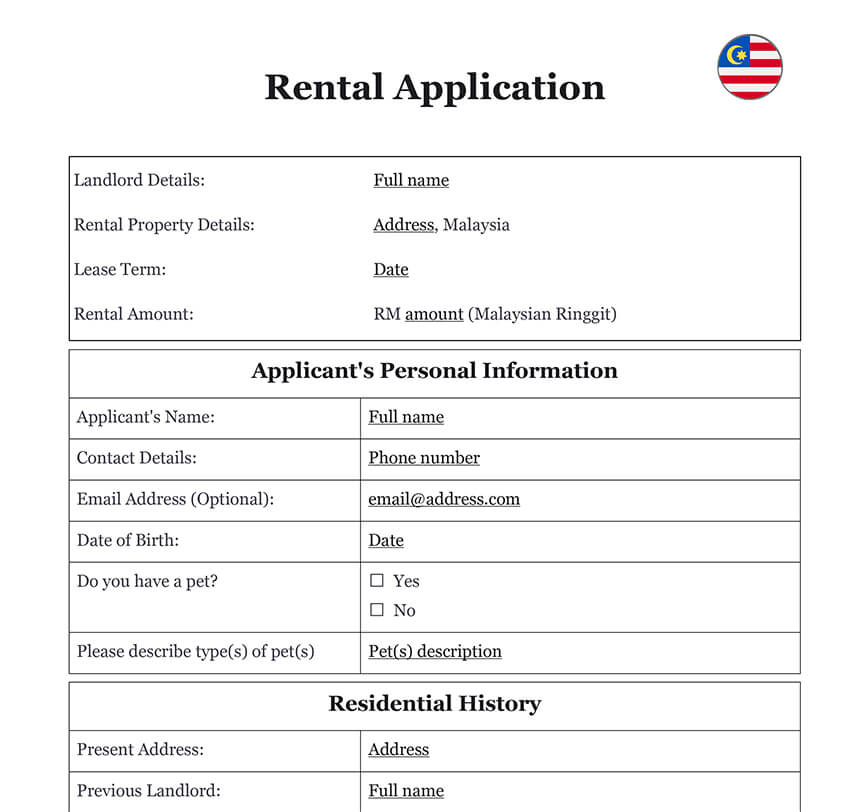Ready to use legal template
Work on without any hassle
Chinese-English translation
Ready to use legal template
Work on without any hassle
Chinese-English translation
Home › Rent your property › Rental application
Learn more about Rental Application in China
A Rental Application is a formal document that potential tenants submit to a landlord or property manager when applying to rent a property. It collects essential information such as the applicant’s personal details, employment status, income, rental history, and references. In China, a well-structured Rental Application is crucial for landlords to assess a tenant’s reliability and financial stability before signing a lease agreement. It helps ensure compliance with local rental laws and reduces risks for both parties. Download our Rental Application form fully editable in Word format, available in English and Mandarin, and designed to meet China’s legal and regulatory requirements.
Table of contents
-
What is a Rental Application in China?
-
What is included in this Rental Application?
-
Is a Rental Application legally required in China?
-
What documents are required for a Rental Application?
-
What credit or background checks are done for a Rental Application?
-
Is a security deposit required with a Rental Application?
-
How long does it take to process a Rental Application?
-
What should I do if my Rental Application is rejected?
-
What legal protections does it provide for tenants?
What is a Rental Application in China?
A Rental Application is a formal document that potential tenants submit to a landlord or property manager when applying to rent a property. It collects essential information such as the applicant’s personal details, employment status, income, rental history, and references. In China, a well-structured Rental Application is crucial for landlords to assess a tenant’s reliability and financial stability before signing a lease agreement. It helps ensure compliance with local rental laws and reduces risks for both parties.
What is included in the Rental Application?
A comprehensive rental application should include several key details to help the landlord or property management assess the tenant’s suitability. These details assist in evaluating the financial stability and reliability of the tenant.
A rental application in China should include the following elements:
| ➤ Landlord Details: The full name of the landlord or property manager of the rental property in China. |
| ➤ Rental Property Details: The complete address of the rental unit, including city and district. This includes additional information like the building name or unit number if needed. |
| ➤ Lease Term: The duration of the lease agreement, specifying the start date and end date. |
| ➤ Rental Amount: The agreed-upon monthly rent in Chinese Yuan (RMB). |
| ➤ Applicant’s Personal Information: Full name, contact details (phone number and email), and date of birth of the prospective tenant. |
| ➤ Pet Ownership: Indicates whether the applicant has pets and describes the type and number of pets. |
| ➤ Residential History: Current address and previous landlord details for reference. |
| ➤ Employment Details: The name of the employer, job title, salary in RMB, and contact details for employment verification. |
| ➤ Additional Income: Declares any other sources of income that help support rent payments. |
| ➤ Banking Information: The name of the applicant’s bank and account details for rent transactions. |
| ➤ Emergency Contact: The full name of a trusted contact person to reach in case of emergencies. |
| ➤ Authorization and Declaration: The applicant consents to reference checks, including credit and background verification in accordance with Chinese rental regulations. |
Is a Rental Application legally required in China?
In China, a rental application is not legally mandatory, but it is strongly recommended to ensure transparency between the tenant and landlord. Many landlords require a formal rental application to verify the tenant’s details before signing the lease agreement. This helps mitigate risks related to unpaid rent, tenant disputes, and other issues.
However, if a landlord chooses not to require a rental application and signs a lease agreement without verifying the tenant’s background, they may face increased risks. For tenants, it is advisable to submit a complete and honest application to facilitate the rental process.
What documents are required for a Rental Application?
The documents required for a rental application in China may vary depending on the landlord and property management company. However, some documents are typically requested to verify the information provided in the application. Common documents include:
| ➤ Proof of Identity: A copy of the applicant’s passport or national ID to verify their identity. |
| ➤ Proof of Employment: A recent pay slip or employment contract to confirm the applicant’s employment status and income. |
| ➤ Rental History: Reference letters or contact details of previous landlords to verify the applicant's track record as a responsible tenant. |
| ➤ Bank Statements: Recent bank statements to demonstrate the applicant's ability to manage finances and pay rent. |
| ➤ Guarantor Information: If applicable, details of a guarantor who will assume financial responsibility if the tenant fails to meet obligations. |
These documents allow the landlord to verify the tenant’s financial stability and ensure a reliable rental arrangement. For official rental documentation guidelines, visit the Ministry of Housing and Urban-Rural Development of the People’s Republic of China.
What credit or background checks are done for a Rental Application?
In China, credit and background checks are an essential part of evaluating a rental application. Landlords may request authorization from the applicant to conduct a credit check to assess their financial history and ability to meet rental obligations. Additionally, landlords may verify the applicant’s background, including criminal history and any past rental disputes.
1. Credit Checks
These checks are typically done through third-party agencies and may include a review of the applicant’s credit score and history of payment. This helps landlords understand whether the applicant is financially reliable.
2. Background Verifications
Landlords may also conduct background checks, which could include criminal records and tenancy history. These checks help identify any potential red flags that may affect the applicant’s suitability as a tenant.
Is a security deposit required with a Rental Application?
Yes, a security deposit is typically required when submitting a rental application in China. The amount of this deposit is generally equivalent to one or two months’ rent and serves as a guarantee against potential damages to the property or unpaid rent. The deposit is refunded at the end of the lease if the property is in good condition and the tenant has met all financial obligations.
- Remarks:
It is important for the security deposit to be clearly stated in the Lease Agreement, and it should be paid when the rental agreement is signed.
How long does it take to process a Rental Application?
The processing time for a rental application can vary based on several factors, including the demand in the market, the landlord, and the property management company. Typically, the process can take anywhere from a few days to a week.
During this time, the landlord or property management company verifies the information provided, performs necessary background checks, and may request additional documents if needed. It is advisable to submit the application as soon as possible and ensure all required documents are complete to avoid delays.
What should I do if my Rental Application is rejected?
If your rental application is rejected, it is essential to ask for feedback to understand the reason for the rejection. This could be due to financial issues, an unfavorable rental history, or another factor. Once you understand the reason, you can work to address the issue (e.g., obtaining a guarantor or providing additional financial documents).
What legal protections does it provide for tenants?
A Rental Application itself does not provide direct legal protections for tenants, but it plays an important role in the leasing process. Once the rental application is accepted and a lease agreement is signed, tenants are protected under China’s Housing Lease Law, which governs the rights and responsibilities of both landlords and tenants. This law covers various situations, including the termination of the lease and Eviction Notices, which are required if the landlord decides to remove the tenant due to a breach of the Lease Agreement.
ℹ️ Legally notify tenants of lease violations or termination with a clear and enforceable Eviction Notice Letter.
1. Tenant Protections under Housing Lease Law
Tenants are entitled to enjoy the property without interference from the landlord, provided they meet their financial obligations. The law also provides protections regarding the termination of the lease, eviction procedures, and the return of the security deposit.
2. Legal Recourse for Tenants
If a landlord violates these rights or fails to uphold their end of the lease agreement, tenants can seek legal recourse. The rental application and the lease agreement serve as essential documentation that tenants can use in any dispute resolution process. In cases of serious disputes, tenants can take legal action to recover damages or to enforce their rights.
Conclusion: Why does Rental Application matters in China?
A Rental Application in China is an essential document for both tenants and landlords. It serves as the foundation for establishing a formal rental relationship, ensuring transparency, and providing crucial information for assessing the tenant’s ability to meet their rental obligations. Whether you’re a landlord seeking reliable tenants or a tenant looking to secure a rental property, having a well-prepared rental application can smooth the process and protect both parties.
SPECIAL OFFER
Landlord
10 Document Package
Essential documents for managing rental property in China
Rental ApplicationTemplate (.docx)
Easy and quick to customize
310 client reviews (4.8/5) ⭐⭐⭐⭐⭐
Share information
Why Themis Partner ?
Make documents forhundreds of purposes
Hundreds of documents
Instant access to our entire library of documents for China.
24/7 legal support
Free legal advice from our network of qualified lawyers.
Easily customized
Editable Word documents, unlimited revisions and copies.
Legal and Reliable
Documents written by lawyers that you can use with confidence.




